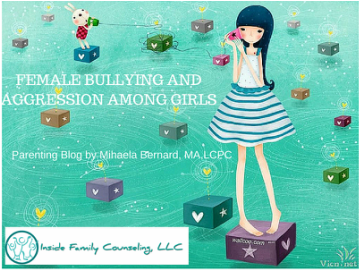 Image by Mulan, flickr.com
Image by Mulan, flickr.com I stumbled upon Odd Girl Out while looking for another book: American Girls: Social Media and the Secret Lives of Teenagers by Nancy Sales. When I read it, I’ll make sure to report back. But, I was fascinated to see something that I myself experienced as a girl shared by so many other girls and women. As we find out in the book, that’s what Simmons discovered as she interviewed girls between the ages of 10 and 14 from ten schools around the country, becoming a part of these girls’ community and talking to them for a period of one year.
Here is what she says in the introduction:
“Our culture refuses girls access to open conflict, and it forces their aggression into nonphysical, indirect and covert forms. Girls use backbiting, exclusion, rumors, name-calling, and manipulation to inflict psychological pain on targeted victims.”
In today’s era of the reign of social media and technology, imagine the impact all of these bullying strategies have on our daughters. The aggression is only amplified by catalysts like SnapChat, Twitter and Facebook. Simmons continues:
“Within the hidden culture of aggression, girls fight with body language and relationships instead of fists and knives.”
Well, if social media is the main platform for teenagers and young people today to form relationships, and we know that cyberbullying has been a real problem nowadays, think about the combined effect of the hidden culture of aggression and social media on our girls today.
We rarely think about this but if something is wrong with a boy, more often than not, we know it because most boys tend to act out - they get into trouble at school, they get mixed up with the “wrong” crowd, start drinking or acting overtly aggressive one way or another. In a way, we should be happy they do that because they are communicating that something isn’t right and making the adults aware of their need for closer attention.
Many girls, on the other hand, tend to internalize their struggles and to channel them into their friendships or their school work. Add to that mix the pressures of school performance and the dynamics of the family, and you get yourself quite the combination of stressors. That’s A LOT of pressure for one person to handle, don’t you think?
That is why I think we often see with young girls that when something goes awry with a girlfriend or a family member, that’s when all the repressed, internalized and never-verbalized feelings explode into a myriad of symptoms from depression and anxiety to suicidal ideation, self-harm and even hospitalization.
Just something to think about next time your daughter comes home with a complaint about her girlfriends at school. It’s good if she does. Talk to her.
Are you worried about your (teenage) daughter and her relationships at school? Share your concerns in the comments or send me an email.



 RSS Feed
RSS Feed